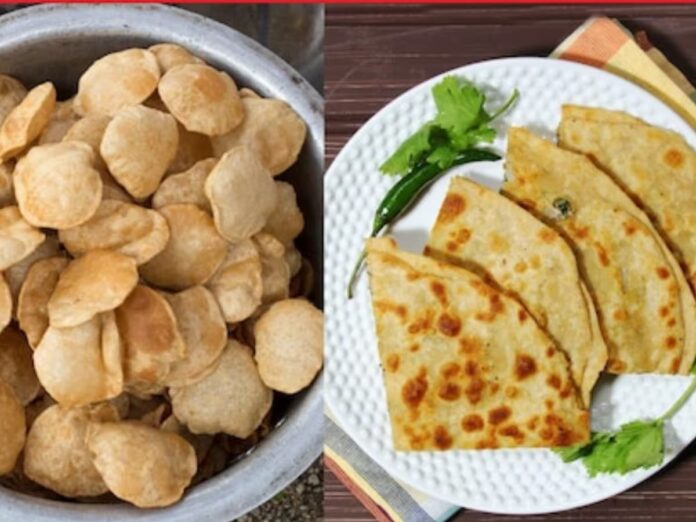Every day, roti is a staple for lunch and dinner in most Indian households. While wheat flour roti is commonly prepared daily, there are times when one craves something different. On such occasions, people opt for parathas or puris. Puri is often reserved for special occasions such as parties, festivals, or functions, as it requires more oil and time to prepare. Parathas, on the other hand, are a popular choice for weekend meals or dinner. Whether it’s paratha or puri, both taste delicious and pair well with vegetables, raita, or chutney. However, as oil and ghee are essential for their preparation, it is important to understand which option is healthier.
How Parathas Are Made
Parathas are a favourite for many. While roti is usually accompanied by dal or vegetables, parathas can be enjoyed with a variety of dishes including chutney, sauce, tea, or even a little curry. Made from wheat flour, parathas can be simple or stuffed with savoury fillings. They are rolled into triangular shapes, cooked on a pan, and brushed with ghee or oil until golden brown.
How Puris Are Made
Puris, also made from wheat flour, are another popular dish. However, some people make puris with refined flour, which is less healthy and can lead to digestive issues like constipation. Puris made from wheat flour are easier to digest. To prepare puris, ingredients such as carom seeds, nigella seeds, and salt are mixed into the dough. For savoury puris, onions, green chillies, and ginger may also be added, which are beneficial for digestion. The puris are then deep-fried, which requires more oil. While delicious, eating puris every day is not recommended. They are best enjoyed occasionally at festivals or a few times a month.
Which Is Healthier: Puri or Paratha?
Parathas are generally a healthier option than puris because they require less oil. Puris, being deep-fried, often absorb more oil, and the leftover oil is sometimes reused, which is harmful to health. Repeatedly heating oil at high temperatures releases carcinogens and destroys the nutrients in the oil. In contrast, parathas are cooked on low heat, preserving the nutrients in the flour, making them more nutritious than puris.
When making puris, leftover oil or ghee is often reused, whereas parathas are prepared with fresh ghee or oil. Reusing oil can increase fat levels in the body and lead to high cholesterol, which is detrimental to heart health.


